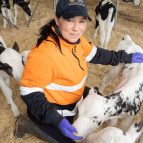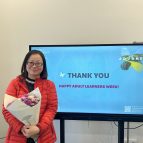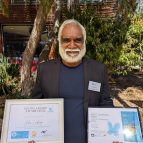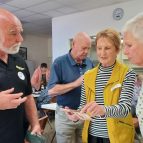Enabling employment
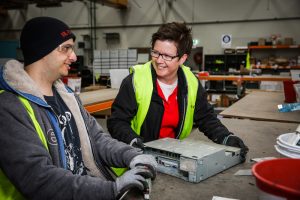
Most of us have got a pile of unwanted electronic devices at home or work that we’ve got no use for. What to do with this growing pile of waste that is harmful to the environment is the question.
While our electronic waste is growing, so too is the demand for jobs among the most disadvantaged groups in Australia, with high unemployment rates for people with disabilities, refugees and asylum seekers and Aboriginal and Torres Strait Islanders.
With a passion for the environment and social justice Julie McKay came up with a solution to tackle both environmental and social problems. In 2013, she founded Enable a social enterprise to re-use and recycle e-waste staffed by disadvantaged people in Broadmeadows in Melbourne’s north.
People who work at Enable include migrants and refugees, people with disabilities and most recently clients from the Department of Justice. All are referred by a range of agencies including NDIS and local English language programs so they can learn new skills and improve their chances of finding work.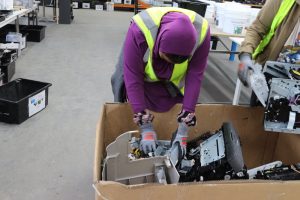
Social enterprise for all abilities
At the same time, Enable is a highly commercialised not for profit organisation and it can be a juggle to balance running a business and employing people of all abilities.
‘We work hard to get that balance right. We work with a broad range of people – from someone who may have been an engineer in their home country to someone local who is on the autism spectrum. We make sure that everyone does work that is suited to their abilities so that really sets people up for success.’
Once e-waste is delivered to the warehouse, it passes through a number of processes and each step requires different skills. Firstly staff weigh and log each donation, sorting it into its components – network servers, modems, printers, monitors, hard drives and keyboards. Each component is then logged into a database. Then it’s tested and categorised as either capable of repair and reuse and resale online or categorised as ‘dead’ and sent off to the ‘graveyard’ where it is dismantled for recycling.
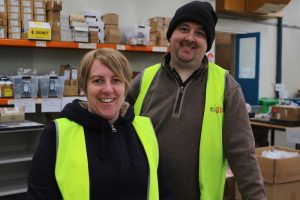
On-the-job training and e-waste
Julie says crew leader Mick Hodgson, who has a background in IT testing and repairs, is rigorous when it comes to on-the-job training. ‘We have a very thorough induction process that’s very hands-on with the emphasis on occupational health and safety so people get trained in the safe use of equipment such as hand tools and drills. People get proficient very quickly. By the end of a term they can disassemble a floor printer that’s taller than me!’ Julie laughs.
‘One of the biggest attitudinal barriers to employing people with disabilities is employers’ concerns about health and safety. There’s a common misperception out there that people with disabilities are going to be higher risk. We really focus on busting that myth so that our participants can go along to job interviews and talk eloquently about the importance of safety at work and ways to go about it.’
As well as being well-schooled in occupational health and safety, Enable participants can add use of specialised technology to their job applications.
‘Our participants learn to use recognised systems in IT for testing communication networks, and industry standard equipment and software for capturing asset information and data destruction. So it looks great on their CVs.’
While Enable staff work hard at establishing a supportive environment, they set the tone from the start about workplace expectations. ‘We are not a welfare agency. We have expectations about attendance and if someone’s attendance is poor then we go through the same process you would in any workplace – three warnings and you’re out. If someone doesn’t show up for their shift, for example, we will give them a call. If they miss a shift they are expected to come in and make up the lost time.’
Developing partnerships
Enable also takes on contracts that allow them to offer participants paid work.
‘We have a very successful social procurement partnership with Reece Group and we have processed over 55 tonnes of their decommissioned assets, for re-use or ethical recycling. We have diverted all that landfill and created opportunities for disadvantaged people in our community. We were already working with them on their e-waste and it seemed a logical next step for us to do the ‘pick and pack’ for their staff’s IT needs. So now we have become embedded in their supply chain. We distribute all the communication components for their new employees like car mounts, phone holders, that sort of thing. It’s a win win.’
Julie sees opportunities to develop two-way learning pathways between Enable and local adult education providers.
‘We offer terrific workplace learning but we would like the opportunity to tailor and develop accredited courses in sustainability as well as getting more formal recognition of the training that our participants have completed on the job.’
Mark’s story
Mark was referred to Enable by a special school when he was 17, Julie says.
‘He had a speech impediment and was selectively mute, a result I think of some severe bullying that he’d been subject to in the past. He had a real knack for sorting because he has a photographic memory, so he could glance at a circuit board and quickly be able break it down by component parts and commodity type. We got him involved in checking the quality of the sorting that other people were doing and we instituted a feedback loop. We gave him the responsibility for explaining to others on the crew when they got things wrong and what changes or improvements needed to be made, for example if they were mixing steel in with plastic. He really worked well as part of that testing team. From there we rotated him through the other stages in the warehouse and he did an exceptional job as a communicator. He was here for over a year and you wouldn’t have recognised at the end of that time that he had any communication issues at all.’
Recent research
Employment-focussed social enterprises:
• improve the lives of marginalised people by offering flexible and secure work
• reduce the costs of welfare, health, and housing services
• offer employment pathways that reduce reliance on government and philanthropic funding.
Source: Centre for Social Impact (CSI) Swinburne and the Westpac Foundation report
Social and environmental impact
Since May 2016, Enable IT Recycling have:
• Delivered 24,414 hours of employability skills to 760 participants
• Created 7,177 paid work hours for disadvantaged community members
• Diverted 151,662 kg of e-waste such as computers, monitors, printers, keyboards and phones away from landfill
See the full issue of Quest 3, 2019

